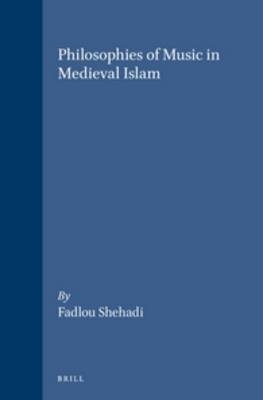
Philosophies of Music in Medieval Islam
Seiten
1995
Brill (Verlag)
978-90-04-10128-9 (ISBN)
Brill (Verlag)
978-90-04-10128-9 (ISBN)
A survey of the various philosophies of music in Islam between the 9th and 15th centuries. The book traces the influence of Greek thinking and aims to provide a clarification of the central arguments of the Islamic writers concerned, as well as a critical evaluation of their line of thought.
This surveys the philosophies of music of the most important thinkers in Islam between the 9th and the 15th centuries A.D. It covers topics ranging from the physics and aesthetics of sound, the nature of music, its place in the total scheme of things and in human life, the relation between music, astronomy, astrology and meteorology, the relation between music and human feelings character and behaviour, to the question of whether a good Muslim should be allowed to listen to music at all, and if so, to which type.
The book traces the influence of Greek, in particular Pythagorean and Aristoxenian, thinking in Islam on this subject, and aims to provide a philosophically coherent statement of thinking of the Islamic writers concerned, a clarification of their central arguments, as well as a critical evaluation of their line of thought. The author introduces a wide range of material from manuscript sources, including much that has not been published before.
This surveys the philosophies of music of the most important thinkers in Islam between the 9th and the 15th centuries A.D. It covers topics ranging from the physics and aesthetics of sound, the nature of music, its place in the total scheme of things and in human life, the relation between music, astronomy, astrology and meteorology, the relation between music and human feelings character and behaviour, to the question of whether a good Muslim should be allowed to listen to music at all, and if so, to which type.
The book traces the influence of Greek, in particular Pythagorean and Aristoxenian, thinking in Islam on this subject, and aims to provide a philosophically coherent statement of thinking of the Islamic writers concerned, a clarification of their central arguments, as well as a critical evaluation of their line of thought. The author introduces a wide range of material from manuscript sources, including much that has not been published before.
Fadlou Shehadi, Princeton University, is Professor of Philosophy Emeritus at Rutgers University. He has published in Islamic Philosophy: Ghazali's Unique Unknowable God (Brill, 1964), Metaphysics in Islamic Philospy (Caravan, 1982), Ghazali's al-Maqsad al-asnā (Dar al-Mashriq, 1971)
| Erscheint lt. Verlag | 1.9.1995 |
|---|---|
| Reihe/Serie | Brill's Studies in Intellectual History ; 67 |
| Verlagsort | Leiden |
| Sprache | englisch |
| Maße | 155 x 235 mm |
| Gewicht | 417 g |
| Einbandart | Leinen |
| Themenwelt | Kunst / Musik / Theater ► Musik ► Musiktheorie / Musiklehre |
| Geisteswissenschaften ► Philosophie ► Philosophie des Mittelalters | |
| Sozialwissenschaften ► Soziologie ► Spezielle Soziologien | |
| ISBN-10 | 90-04-10128-4 / 9004101284 |
| ISBN-13 | 978-90-04-10128-9 / 9789004101289 |
| Zustand | Neuware |
| Haben Sie eine Frage zum Produkt? |
Mehr entdecken
aus dem Bereich
aus dem Bereich
Grundbegriffe, Harmonik, Formen, Instrumente
Buch | Softcover (2021)
Philipp Reclam (Verlag)
7,80 €
Jazz als Gegenkultur im westlichen Nachkriegsdeutschland
Buch | Hardcover (2024)
edition text + kritik (Verlag)
42,00 €
Professional Music, Musikarbeitsbuch
Buch | Softcover (2022)
Leu-Vlg Wolfgang Leupelt (Verlag)
34,00 €


